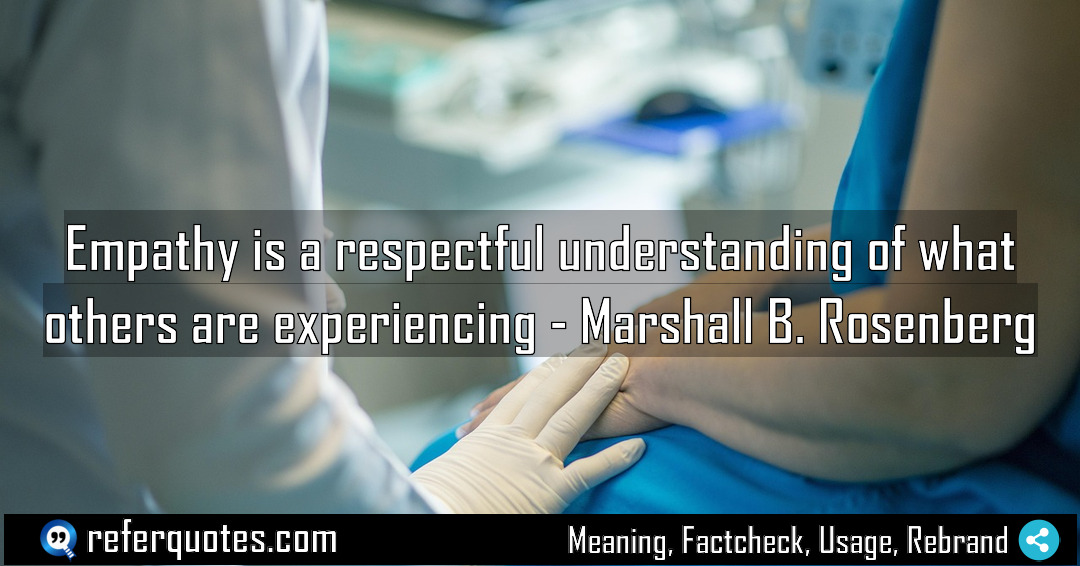
Empathy is a respectful understanding is one of those concepts that seems simple until you try to actually do it. It’s not about fixing problems or agreeing, but about truly getting where someone is coming from, without judgment. This shifts entire conversations.
Share Image Quote:
Table of Contents
Meaning
At its heart, this quote means that real empathy is an act of focused, non-judgmental attention. It’s about understanding another person’s reality from their perspective and holding that understanding with respect.
Explanation
Let me break this down because the word “empathy” gets thrown around so much it’s lost its punch. Rosenberg is making a critical distinction here. He’s not talking about sympathy, which is feeling *for* someone. And he’s definitely not talking about agreement.
He’s talking about a specific skill. Respectful understanding. That means you empty your mind. You stop thinking about your reply, you stop diagnosing, you stop trying to make them feel better. You just listen to understand what it’s like to be in their shoes, in their world, with their feelings and needs. And you do it with a fundamental respect for their experience, even if it’s completely different from your own. It’s a game-changer.
Quote Summary
Reading Level70
Aesthetic Score85
Origin & Factcheck
This is straight from Marshall B. Rosenberg’s 1999 book, Nonviolent Communication: A Language of Life. It’s a cornerstone of the NVC model he developed, primarily in the United States. You sometimes see similar sentiments attributed to other thinkers, like Carl Rogers, but this specific phrasing and its framework are uniquely Rosenberg’s.
Attribution Summary
Where is this quotation located?
| Quotation | Empathy is a respectful understanding of what others are experiencing |
| Book Details | Publication Year: 1999; ISBN: 9781892005038; Last edition: 3rd Edition (2015); Number of pages: 264. |
| Where is it? | Chapter 8: The Power of Empathy, Page 130 (2015 edition) |
Context
In the book, this isn’t just a nice idea. It’s a practical tool. He places this definition right in the middle of explaining how to receive messages from others *empathetically*, whether they’re full of anger or pain. It’s the antidote to the defensive, advice-giving, one-upping responses that shut down communication. It’s the core of what he calls “compassionate communication.”
Usage Examples
So how does this look in the wild? Let’s say your partner comes home frustrated from work.
- The Old Way (Advising): “You should just talk to your boss about it tomorrow.” (This dismisses their feeling).
- The Rosenberg Way (Empathy): “So it sounds like you’re feeling really frustrated because you need some recognition for all that hard work?” (This is the respectful understanding—you’re reflecting the feeling and the unmet need you hear).
This works with managers dealing with team conflict, parents navigating toddler meltdowns, and honestly, anyone in a relationship who wants to actually connect instead of just waiting for their turn to talk.
To whom it appeals?
Share This Quote Image & Motivate
Motivation Score85
Popularity Score90
Shareability Score85
FAQ
Question: Is this the same as just being nice and agreeing with everyone?
Answer: Not at all. In fact, it’s the opposite. You can have deep respect for someone’s experience while completely disagreeing with their opinion. Empathy is about understanding their perspective, not endorsing it.
Question: But what if the other person is just wrong?
Answer: That’s the hardest part. You have to suspend your own “right/wrong” framework temporarily. The goal isn’t to prove a point; it’s to connect with their humanity. Often, once someone feels truly heard, they become able to hear you.
Question: This sounds exhausting. Do I have to do this all the time?
Answer: Great question. No, you don’t. It’s a tool for moments of conflict, pain, or misunderstanding. It’s a muscle you build. Start small—try it for just one conversation this week and see what shifts.
Similar Quotes
You know, “A prerequisite to empathy is simply paying attention” is such a powerful truth. It cuts through all the complexity and reminds us that real connection starts with a…
Our ability to offer empathy can allow us to stay vulnerable… it sounds simple, but this is the secret sauce to defusing conflict and creating real connection. It’s about disarming…
When we meet others with empathy, we transcend our judgments… It’s a game-changer because it shifts the entire dynamic of a conversation from conflict to connection. You stop seeing people…
When we stay with empathy, we allow others to fully express themselves. It’s a game-changer because it removes the fear of judgment. This simple shift transforms how we connect with…
When we are in pain, empathy is what helps us reconnect to life. It’s a simple but profound truth about how we heal from emotional hurt. This isn’t about fixing…
